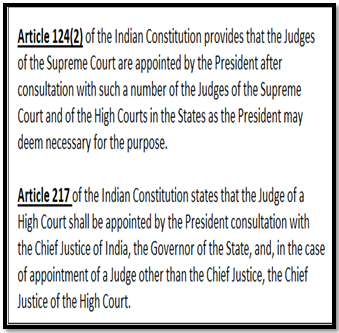NEW SUPREME COURT JUDGES APPOINTED
Why in the news?
- President Droupadi Murmu appointed Justices N. Kotiswar Singh and R. Mahadevan as Supreme Court judges.
- Their nominations were recommended by a five-member Collegium led by Chief Justice of India D.Y. Chandrachud on July 11.
- Justice N. Kotiswar Singh is the first judge from Manipur appointed to the Supreme Court, providing representation to Northeast India.
- Justice R. Mahadevan, from a backward community in Tamil Nadu, aims to enhance diversity on the Supreme Court Bench.
source:wordpress
Collegium system for judicial appointment:
- Judges of higher judiciary appointed via the collegium system.
- Comprises Chief Justice of India and four senior-most Supreme Court judges.
- Decides on judicial appointments, elevations, and transfers.
- Term “collegium” not in Indian Constitution; established by judicial rulings.
Constitutional provisions for judicial appointment:
Article 124:
- The President appoints Supreme Court judges after consulting relevant judges of High Courts and Supreme Court.
- Chief Justice of India (CJI) consulted for all appointments except their own.
Article 217:
- The President appoints High Court judges after consulting the CJI and Governor of the state.
- The Chief Justice of the High Court also consulted in the appointment process.
| About Appointment of Judges of supreme court:
Composition and Strength:
Qualifications for Appointment:
Appointment, Tenure, and Resignation:
|




